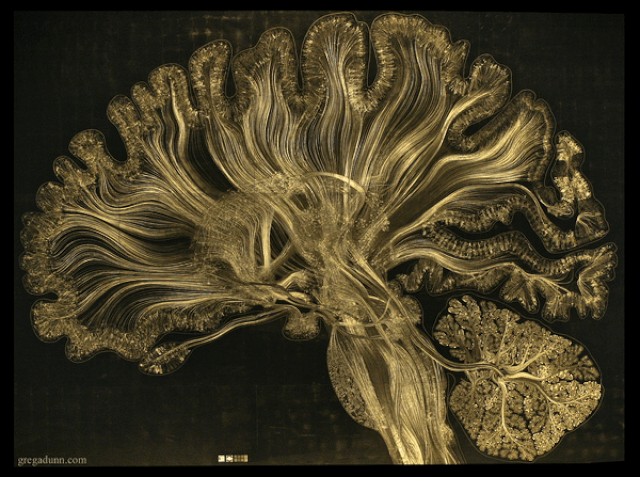


SOULFUL Insights is a regular series featuring expert advice on matters relevant to health and wellness. Specialists, with interests that intersect with our salon topics, will share their respective insights. Our aim is to deliver cutting-edge science and wellness information to you, our reader.
Top 14 Things You Should Do Now to Reduce Your Risk of Alzheimer's Disease
by Ed Park, PhD
June is Alzheimer's and Brain Awareness Month—a perfect time to learn about Alzheimer's disease, reflect on your own brain health and that of your loved ones, and learn ways to prevent it. Alzheimer's disease is the most common form of dementia. It devastates a person's memory, thinking and behavior. It can overwhelm families with caregiving and financial and emotional burdens.
One in nine Americans over 65 years old has Alzheimer's, and many more suffer from related dementias. The total number of Americans stricken by this disease is nearing 7 million, and it is expected to triple by 2050. Rather than wait for dementia to creep up on you (gradual changes in your brain may take 20–30 years to appear as symptoms), you can start taking action today to reduce your risk. In fact, research shows that people who adopt several healthy lifestyle factors can potentially reduce their risk by as much as 60%.
Here, you'll find a list of actions you can take to improve your brain health and reduce your risk of Alzheimer's, based on the latest research and the Lancet Commission's ongoing report on dementia prevention. You'll find nutritional advice sprinkled throughout, as well as key lifestyle habits to follow.

1. Get your daily fill of leafy green vegetables: Leafy green vegetables are packed with nutrients that support the brain. These nutrients provide antioxidant and anti-inflammatory effects to reduce damage. Leafy greens provide polyphenols, which are plant-based pigments known for their numerous health benefits. Kaempferol is a polyphenol in leafy greens like spinach, kale and arugula, which has been shown to reduce the risk of Alzheimer's by 50% in the top fifth of those consuming it! Leafy greens also provide essential minerals like magnesium and iron, as well as gut-healthy fiber. Aim for 1 cup of raw leafy greens or ½ cup of cooked leafy greens daily to attain brain benefits and gut-healthy fiber.
2. Practice stress management and prioritize mental health, especially depression: Everyone experiences stress in their daily lives, and not managing stress can take a significant toll on the body. Studies have shown that chronic stress over time can have a negative impact on memory in older adults. Also, keep in mind that chronic stress and depression are related and can feed off each other. In fact, depression, and then anxiety, may be the very first indicators of a heightened likelihood of Alzheimer's, happening about nine years before onset. There are many ways to reduce the effects of stress on the body. Some standard stress management practices include deep breathing or meditation, exercise, keeping a gratitude journal, spending time with loved ones and practicing self-care.
3. Connect with friends or family every day: Interacting with people close to you stimulates different parts of the brain and supports attention and memory. Studies have linked more social activity with less cognitive decline during old age. Make a point of connecting with family or friends daily, even if it's just a quick phone call. Our brains are made for relationships!
4. Enjoy a handful of berries daily: Berries are often considered a "superfood," and for good reason. They are rich in polyphenols like anthocyanins, flavonoids and stilbenes, which offer powerful antioxidant and anti-inflammatory effects to protect the brain from damage. Studies have found a decreased rate of cognitive decline in those consuming just 1–2 servings of berries per week. Spring and summer are a perfect time to enjoy fresh berries, but frozen berries are a great alternative when you can't find fresh, and they provide the same benefits.
5. Get some fresh air: Exposure to air pollutants and fine air particles is associated with poor health, and that includes a higher risk of dementia (up to 60% higher). While it's challenging to separate air pollution from other factors, research is showing that air pollution may contribute to Alzheimer's pathology, like amyloid deposition. Thus, while it's not easy for everyone to relocate to the countryside, there are some simple ways to freshen our air. Try decorating with houseplants. Spider plants, bromeliads and dracaenas are especially good at filtering nitrogen dioxide and volatile organic compounds from the air. Make sure to also regularly change your home's HVAC filters.

6. Get 7–9 hours of sleep every night: Sleep is critical for the body and brain to function properly. It plays a role in learning, memory, concentration and supporting communication between neurons. An analysis of studies looking at the relationship between sleep and Alzheimer's found a significantly higher risk of Alzheimer's in those who had sleep disturbances or sleep disorders. Prioritize high-quality sleep by sticking to a regular sleep schedule, avoiding alcohol or caffeine before bed and putting away screens at least 30 minutes before bed.
7. Be physically active for 30 minutes a day (even if it's just a walk): Exercise profoundly affects brain health. It reduces inflammation, improves blood flow to the brain, lowers stress hormones and even increases brain volume. Several studies have shown that exercise improves memory function in adults. The key is to exercise regularly. Exercise can come in many forms, from walking or running to swimming or cycling. Any aerobic exercise that increases the heart rate can benefit brain health. Just a 30-minute walk with a friend can have profound brain benefits from the combination of moving and socializing.
8. Make sure you get enough Omega-3s: Omega-3s are healthy fats that help maintain the structure of cells and regulate cell communication, fighting neuroinflammation and improving memory and mood. Several studies have reported the benefits of omega-3s in reducing the risk of dementia and improving cognitive function. You can achieve an adequate intake of omega-3s from fatty fish like salmon, mackerel, sardines or anchovies, as well as from nuts and seeds like flax seeds, chia seeds or walnuts.
9. Read or play games that activate your brain: Just like you need to exercise physically to keep your body in shape, you need to exercise your brain to keep your brain healthy as you age. Many studies have demonstrated a reduced risk of Alzheimer's with an increased frequency of cognitively stimulating activities. Using your brain in different ways has been shown to have more powerful effects on brain health. For example, try a new puzzle or game every week that activates different parts of the brain, or choose a new language to learn. Picking up new hobbies or continuing old ones, such as playing an instrument, helps keep the brain engaged.
10. Drink at least eight cups of water daily: Water is the most important thing that we consume each day. The human brain is composed of 75% water, so it's understandable that only 2% dehydration can impact memory and processing speed. A recent study found that drinking water enhances performance on cognitive tests measuring working memory, which is the temporary storage of information during tasks and decision-making. Keep a water bottle nearby throughout the day to ensure you stay hydrated, and aim for about eight cups (64 ounces) daily.
11. Watch out for hearing loss: If you have to raise the volume of your TV or find it hard to hear high-pitched voices (like those of children), it could be hearing loss. Age-related hearing loss is very common, with about 40% of people over age 50 experiencing some hearing loss and over 70% of those over age 70 having hearing loss. Hearing loss can lead to social isolation and hinder cognitive stimulation, and it is associated with an almost doubled risk of dementia. Evidence shows that hearing aids can protect from cognitive decline. So, don't hesitate to see your audiologist to ensure your hearing is up to par.

12. Stay on top of your heart and metabolic health: It is becoming clear that all aspects of health are connected to brain health. A couple of key health measures are heart health and metabolic (think diabetes) health, as they have been directly linked to Alzheimer's risk. For example, a significantly increased risk of Alzheimer's is associated with diabetes and obesity. It's important to keep track of your heart and metabolic health to recognize if any issues need to be addressed. Early detection makes it easier to make the adjustments necessary to maintain health and prevent damage to the brain.
13. Know your genetic risk: The genes associated with familial Alzheimer's disease are APP, PSEN1, and PSEN2. These genes are considered diagnostic, meaning having one or more high-risk versions is highly associated with ultimate disease development. There is also the APOE4 gene, which is associated with an increased risk of developing the disease. It is estimated that having one copy of the APOE4 gene increases risk three-fold, and having two copies increases risk up to 12-fold. Knowing your genetic predispositions can help you make informed decisions to manage your health proactively.
14. Consider a supplement to fill the gaps in your diet: NeuroReserve's passion is in nutritional products for brain health. It's understood that it's challenging for people to eat all the nutrients their brain needs daily, especially given the busyness of life. Taking a daily supplement may help fill these nutritional gaps. RELEVATE contains 17 well-researched nutrients to support long-term brain health. Its dosages are based on those consumed in brain-healthy diets like the Mediterranean and MIND diets. RELEVATE is built on evidence from long-term studies of these brain-strengthening diets that are linked to significantly reduced risk of age-related neurodegenerative disease (over 50% reduced risk of Alzheimer's). The latest 2025 research also shows that the MIND diet may even improve cognitive function with age. You may want to consider a supplement like this if you want to close important gaps and reinforce with brain-protective nutrition.
As a special offer to SOULFUL Insights readers, NeuroReserve is offering a 15% discount on subscriptions and individual orders. Just use the discount code SOULFOODSALON at checkout.
You can do a lot today to support your brain to prevent Alzheimer's, but you don't have to do everything at once. Pick one or two things you want to prioritize and gradually add more when possible. The key is finding the things that work for you to sustain a brain-healthy lifestyle.
This Alzheimer's and Brain Awareness Month, take your first (or next) steps toward a longer lifespan, healthspan and brainspan! We hope this has inspired you to take action for your cognitive health, including reducing the risk of Alzheimer's disease.
Resources
Click here for the list of references.
Ed Park, PhD

Edward S. Park, PhD, is founder and president of NeuroReserve. Ed has over 18 years of experience in the research and development of biopharmaceuticals and medical devices, particularly to treat malnourishment due to medical conditions. Ed's family history of neurodegenerative disease (his father) led him toward brain health, where he realized the powerful role nutrition and dietary patterns can play in reducing the risk of Alzheimer's, Parkinson's and neurodegeneration—inspiring him to found NeuroReserve. Ed is a guest lecturer at the Cleveland Clinic and has presented on the topic of nutrition and brain health in various podcasts and seminars. He holds a PhD in chemical-biomolecular engineering from the Georgia Institute of Technology. He also has an MS and MBA from the Massachusetts Institute of Technology.
Instagram @neuroreserve
Facebook @neuroreserve


































































































































.png)

















.jpg)














